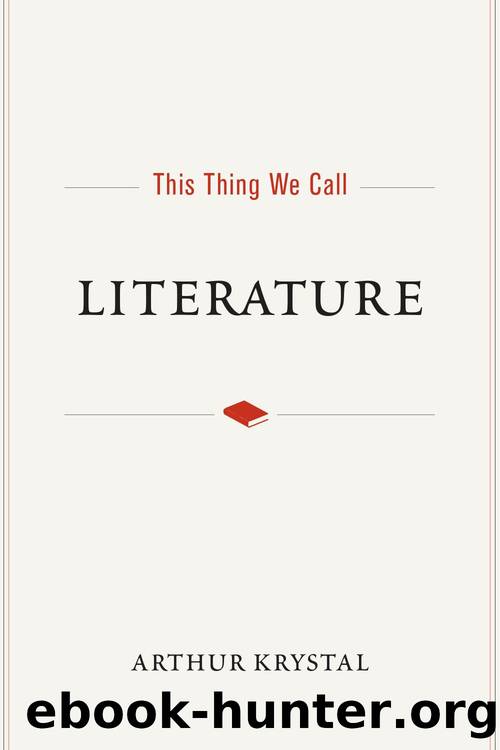This Thing We Call Literature by Krystal Arthur;

Author:Krystal, Arthur; [Krystal, Arthur]
Language: eng
Format: epub
Publisher: Oxford University Press, Incorporated
Published: 2016-02-28T00:00:00+00:00
Five years ago, in the New Yorker, Dan Chiasson delivered a thoughtful paean to the work of Rae Armantrout, the 2010 recipient of the Pulitzer Prize. After duly noting Armantroutâs sure touch with language, the finesse of her method, and the delicacy with which she handles the vagaries of experience, he fastens on her strong suit. Her poems are about consciousness, the awareness of being aware, which makes them reflexively chart the course of their own difficulty: âItâs the mind as problem-solving device, almost as calculator,â Chiasson writes, âthough it is, of course, most drawn to problems that cannot be solved.â The insouciant assurance of that âof courseâ made me realizeânot for the first timeâthat I am not interested in a poetâs mind; itâs not what draws me to poetry.
If I wanted to know what interesting minds think, I would pick up Hume, Schopenhauer, Nietzsche, Wilde, or the letters of Eliot and Keats as opposed to their poems. Yes, of course, Shakespeare, Donne, Keats, Eliot, Lowell, and Dickinson had interesting minds. Thatâs not the point. Readers didnât read those poets just for the contents of their minds; they read them for the sound of their words. Even when poets were nominally âthe unacknowledged legislators of the world,â poetry consisted of lines that rhythmically fixed themselves in the mind. Do poets or readers today still take this on faith? Admittedly, I may be ignorant of many English-speaking poets whose compositions reverberate by rhythmic designâso far, however, I have not encountered them.*
Instead I run into Rae Armantrout. I donât mean to single out Ms. Armantrout; I could just as easily have chosen Kay Ryan or Stephen Dunn or Mark Doty or a dozen other poetsâproficient practitioners, one and all. When I read these poets, I discern intelligence, shrewdness, irony, and humor. I often admire the elliptical shorthand of their phrasing and the precision of their lines, and Iâm tickled by the concentration of appellative nouns and their dispersal in lines that seem to have no give to them. In short, I believe I can appreciate their poetry. Yet, in the end, I remain unmoved by it.
Because there is no music.
Historically, English verse, depending on whom you consult, falls into categories of syllabic or accentual stresses. Deliberate patterns of alternation between stronger and weaker stresses or between shorter or longer syllables establish a regular meter based on the distance between accented syllables. Does that mean that lines must be read with equal emphasis by everyone? Not quite. Metrical invention sometimes follows and sometimes vies with natural speech. Nonetheless, accent and duration have accounted for the ascending or descending rhythms of English poetry since the early sixteenth century.
Generally speaking, poets manipulate natural prose rhythms, creating a base line whose recurrence in the poem gets us tapping our minds and feet. The pattern established, poets can then exercise some discretion. Although formal verse may smack of orthodoxy, a poet who has gone to school with Milton, Donne, Spenser, Browning, and Tennyson can perform rewarding variations on familiar meters and fixed rhyme schemes.
Download
This site does not store any files on its server. We only index and link to content provided by other sites. Please contact the content providers to delete copyright contents if any and email us, we'll remove relevant links or contents immediately.
| Diaries & Journals | Essays |
| Letters | Speeches |
The Rules Do Not Apply by Ariel Levy(4503)
Bluets by Maggie Nelson(4242)
Too Much and Not the Mood by Durga Chew-Bose(4079)
Pre-Suasion: A Revolutionary Way to Influence and Persuade by Robert Cialdini(3958)
The Motorcycle Diaries by Ernesto Che Guevara(3764)
Walking by Henry David Thoreau(3669)
What If This Were Enough? by Heather Havrilesky(3185)
Schaum's Quick Guide to Writing Great Short Stories by Margaret Lucke(3172)
The Day I Stopped Drinking Milk by Sudha Murty(3097)
The Daily Stoic by Holiday Ryan & Hanselman Stephen(3086)
Why I Write by George Orwell(2759)
The Social Psychology of Inequality by Unknown(2743)
Letters From a Stoic by Seneca(2661)
A Short History of Nearly Everything by Bryson Bill(2495)
Insomniac City by Bill Hayes(2383)
Feel Free by Zadie Smith(2375)
A Burst of Light by Audre Lorde(2337)
Upstream by Mary Oliver(2260)
Behave: The Biology of Humans at Our Best and Worst by Robert M. Sapolsky(2159)
